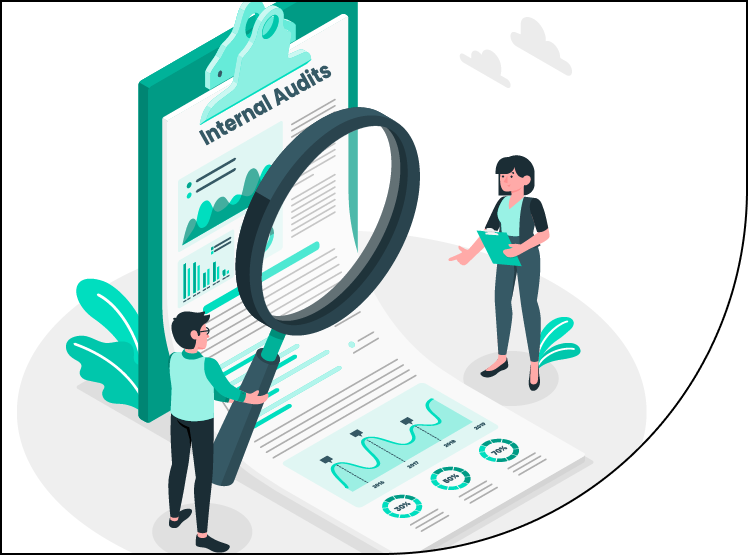Internal Audits
A RANGE OF SOLUTIONS
INCLUDING


Internal Audits
At their core, ISO internal audits are driven by several key principles. Firstly, they uphold the principle of impartiality, ensuring that audits are conducted objectively and without bias. Secondly, they emphasize the importance of competence, necessitating that auditors possess the requisite skills and knowledge to effectively assess processes and procedures. Thirdly, they prioritize confidentiality, safeguarding sensitive information obtained during audits. Finally, they underscore the significance of evidence-based decision-making, requiring audit findings to be supported by tangible evidence.
By upholding key principles and delivering a myriad of benefits, these audits play a vital role in driving continual improvement, ensuring compliance, and ultimately, enhancing organizational performance in today's dynamic business landscape.
The Purpose Unveiled
1.1 Assessment of Compliance
Discover how ISO internal audits systematically evaluate an organization's adherence to chosen ISO standards, ensuring that documented processes align seamlessly with established requirements.
1.2 Identification of Non-Conformities
Delve into the significance of internal audits in pinpointing non-conformities, deviations, or potential shortcomings within the organization, providing a roadmap for corrective actions.
1.3 Continuous Improvement
Explore how internal audits transcend mere compliance, becoming catalysts for a culture of continuous improvement, driving organizations towards excellence.
1.4 Preparation for External Audits
Understand the preparatory role of internal audits, allowing organizations to identify and rectify issues before external certification audits, ensuring asmoother and successful process.
Key Principles Guiding Internal Audits:
2.1 Independence and Objectivity Learn about the critical principles of independence and objectivity that shape effective internal audits, ensuring unbiased evaluations for accurate results.
2.2 Risk-Based Approach Uncover the risk-based approach internal audits adopt, focusing on areas with the highest impact on ISO standards adherence, optimizing resource allocation for efficient audits.
2.3 Systematic Planning Explore the importance of meticulous planning in the internal audit process, including defining scope, objectives, and criteria, and selecting competent auditors.
2.4 Thorough Documentation Understand the significance of thorough documentation in internal audits, providing a comprehensive reference for both conformities and non-conformities, guiding corrective actions and future improvements.
2.5 Collaboration and Communication Discover how effective communication and collaboration between auditors and auditees contribute to a positive audit experience, fostering organizational learning and growth.
2.6 Corrective Action Planning Delve into the critical step of developing and implementing corrective action plans upon identifying non-conformities, ensuring issues are addressed and prevented from recurring.
2.7 Follow-Up Audits Explore the role of follow-up audits in verifying the effectiveness of corrective actions, ensuring sustained improvements and continuous compliance.
Unlocking the Benefits of ISO Internal Audits:
3.1 Risk Mitigation Learn how internal audits proactively identify and mitigate risks associated with non-compliance, creating a resilient management system.
3.2 Process Optimization Discover the role of internal audits in optimizing processes, identifying inefficiencies, and enhancing overall efficiency for streamlined workflows.
3.3 Culture of Continuous Improvement Understand how regular internal audits foster a culture of continuous improvement, encouraging active participation from employees in refining processes.
3.4 Certification Readiness Explore how internal audits act as dress rehearsals for external certification audits, increasing the likelihood of a successful certification outcome.
3.5 Confidence & Trust Learn how the thorough examination of processes through internal audits builds internal confidence and trust, providing a transparent report card for stakeholders
Audit Advantage: Building Stakeholder Confidence through ISO Compliance
Discover the myriad advantages of audits, ranging from providing assurance to stakeholders to acting as a tool for overall improvement. Gain insights into how auditing contributes to fair evaluations, fraud identification, moral policing, and building a good reputation.
2.1 Assurance to Stakeholders
Uncover how audits provide stakeholders with a clear picture of the business's position, offering satisfaction about the functioning of employees and various departments.
2.2 Fair Evaluation
Explore how auditing ensures fair evaluation without the chance of manipulation, providing an unbiased viewpoint from independent authorities.
2.3 Fraud Identification
Understand the role of audits in identifying both intentional misconduct and unintentional mistakes, creating a sense of responsibility among employees.
2.4 Moral Policing
Discover how audits instill a sense of moral accountability in employees, fostering honesty, and avoiding irregularities and irresponsibility.
2.5 Credibility
Explore how audit reports build credibility among stakeholders, including creditors,
2.6 Overall Improvement
Understand how audits provide insights into opportunities for development and business performance, contributing to overall improvement.
2.7 Compliance With Rules and Standards
Explore how audits ensure compliance with standard norms, evaluating the company's conduct against good practices and measuring effectiveness.
2.8 Building a Good Reputation
Discover how regular audit reports build a good reputation for the firm, showcasing teamwork, ethical working, and conduct.
2.9 Legal Proof
Understand how audit reports act as legal proof, serving as a reliable record for insurance purposes and legal proceedings.
2.10 Dispute Settlement
Explore how audits help settle disputes and claims between management, providing independently done assessments for dispute resolution.
Conclusion: Striving for Excellence through Audits
In conclusion, both ISO internal audits and general audits play indispensable roles in organizational success. From ensuring compliance to fostering continuous improvement, audits are the driving force behind excellence. Embrace the power of audits to navigate the complexities of ISO compliance and build stakeholder confidence for sustained success.
